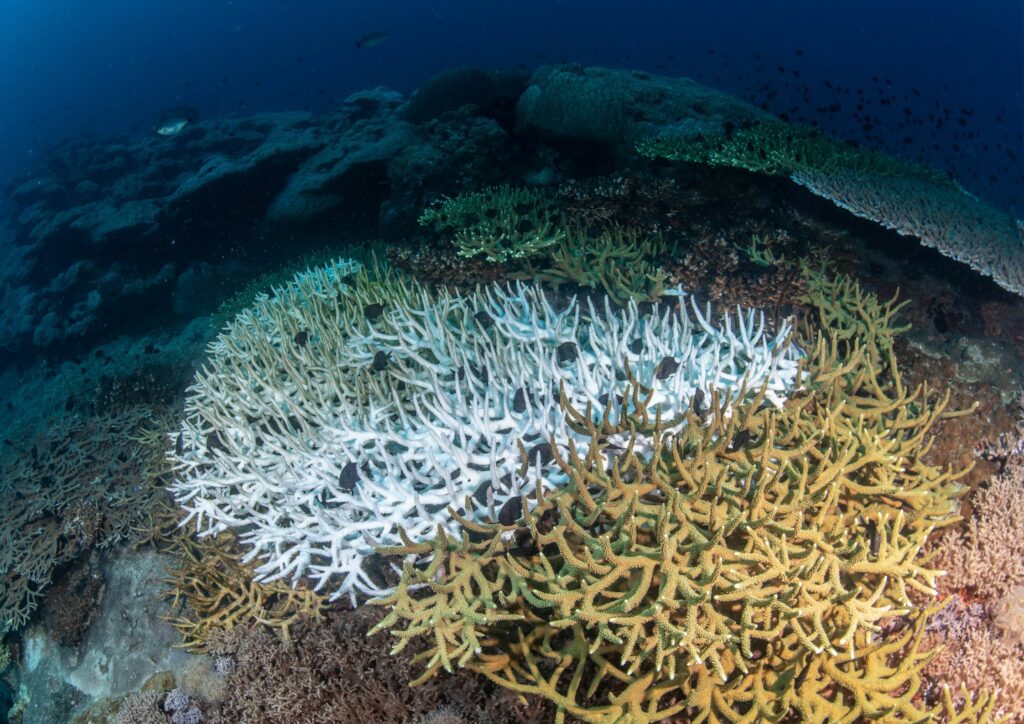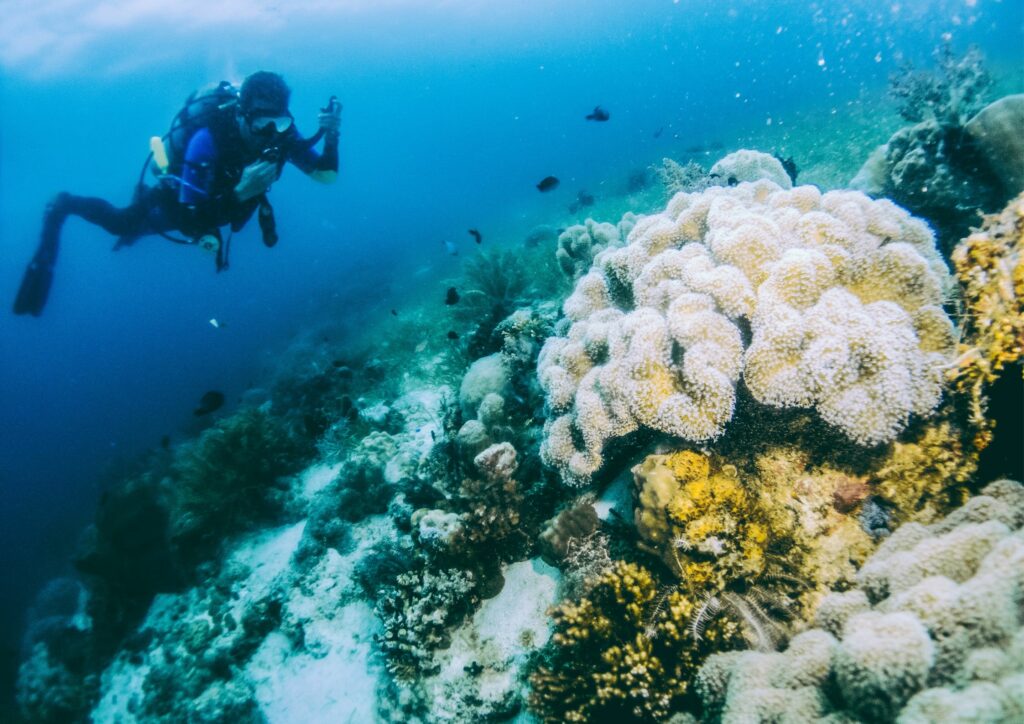Coral bleaching has emerged as a critical issue affecting our underwater ecosystems, driven by the alarming rise in global temperatures and deteriorating environmental conditions. As we witness the vibrant underwater communities become ghostly and lifeless due to this phenomenon, the urgency for coral conservation and innovative solutions like coral planting and underwater clean-ups becomes ever more evident. Understanding the complexities of coral bleaching not only sheds light on the immediate threats to marine life but also emphasizes the need for collective action in combating global warming and protecting our oceans for future generations.
What is Coral Bleaching and Why is it Happening?
Coral bleaching is a phenomenon where corals lose their vibrant colors due to stress, primarily from rising sea temperatures linked to global warming. This process occurs when corals expel the symbiotic algae, called zooxanthellae, that live within their tissues and provide them with food through photosynthesis. Without these algae, corals not only lose their color but also their primary source of energy, making them vulnerable to disease and mortality.
Factors contributing to coral bleaching include increased ocean temperatures, pollution, and sedimentation. The alarming rate at which coral reefs are bleaching poses significant threats to marine biodiversity and the overall health of underwater ecosystems. Coral conservation efforts, such as coral planting and underwater clean-up initiatives, are essential for mitigating these impacts.
The Role of Global Warming in Coral Bleaching
Global warming plays a pivotal role in the occurrence of coral bleaching. As ocean temperatures rise, corals experience stress, leading them to expel the colorful algae (zooxanthellae) that live within their tissues. This algae provides vital energy to the corals through photosynthesis, giving them their vibrant colors. Without these algae, corals turn white and become more susceptible to disease and mortality. Furthermore, increased ocean acidification due to higher carbon dioxide levels also hinders coral growth and resilience. This vicious cycle underscores the urgency of coral conservation efforts, including coral planting and underwater clean-up initiatives, to combat the damaging effects of climate change.
Consequences of Coral Bleaching on Marine Biodiversity
Coral bleaching poses a severe threat to marine biodiversity. When corals experience stress from rising sea temperatures, they expel the symbiotic algae living in their tissues, leading to a stark loss of color and vital nutrients. This phenomenon not only diminishes the corals’ chances of survival but also disrupts the entire aquatic ecosystem that relies on healthy coral reefs.
Fish species that depend on corals for habitat lose their homes, leading to a decline in fish populations. Moreover, the loss of these essential habitats impacts other marine species, resulting in a cascading effect throughout the underwater environment. Coral conservation efforts, including coral planting and underwater clean-ups, are crucial to restore these ecosystems and combat the ongoing threat of global warming.
Strategies for Coral Conservation: Challenges and Solutions
Coral conservation is essential to counter the escalating issue of coral bleaching, primarily driven by global warming. Strategies such as coral planting and restoring damaged reefs are gaining traction, yet significant challenges persist. Access to adequate funding and resources, coupled with the need for advanced scientific research, hinders large-scale conservation efforts. Community involvement in underwater clean-up initiatives is crucial, as local awareness and action can lead to sustainable solutions.
Additionally, fostering partnerships between governments, NGOs, and scientists can enhance the effectiveness of conservation projects, ensuring a collective approach to protection and rehabilitation. Investing in education and outreach programs will empower communities to take part in coral conservation actively, nurturing a long-term commitment to preserving these vital ecosystems. Collaboration across sectors can also lead to innovative techniques that address coral bleaching, ultimately safeguarding marine biodiversity for future generations.
The Importance of Coral Planting in Restoration Efforts
Coral planting plays a crucial role in restoring damaged reefs, directly combating the effects of coral bleaching. By reintroducing healthy corals into affected areas, we can accelerate the recovery of these vital ecosystems. Coral reefs not only support diverse marine life but also protect coastlines and boost local economies. Effective coral conservation strategies include the collection of coral larvae and the cultivation of resilient species in controlled environments. Engaging local communities in coral planting initiatives also fosters long-term stewardship of our oceans. As global warming continues to challenge reef health, proactive efforts like these are essential for maintaining biodiversity and promoting underwater ecosystem resilience.
Community Engagement in Underwater Clean-Up Initiatives
Community engagement plays a crucial role in underwater clean-up initiatives aimed at combating coral bleaching and protecting marine ecosystems. Local volunteers, activists, and organizations come together to remove debris and pollutants that threaten coral reefs, creating a healthier underwater environment. These initiatives not only enhance coral conservation but also raise awareness about the impact of global warming on marine life. By involving the community, we foster a sense of stewardship among participants, encouraging them to advocate for sustainable practices and further coral planting efforts.
Successful Case Studies in Coral Rehabilitation
Across the globe, several successful case studies highlight innovative approaches to coral rehabilitation. For instance, the Coral Triangle Initiative in Southeast Asia demonstrates effective coral conservation and restoration strategies. This initiative combines community engagement, coral planting, and education to empower local fishermen to protect and restore coral reefs. Similarly, projects in the Great Barrier Reef, such as the Coral Restoration Foundation, have showcased the potential of coral nurseries in cultivating resilient coral species.
These success stories emphasize the importance of coordinated efforts and highlight the critical connection between local communities and coral conservation. To further tackle coral bleaching, underwater clean-up efforts have gained traction, reducing pollution and promoting healthier reef ecosystems. Through volunteer-driven clean-up initiatives, communities are coming together to remove debris that threatens the fragile underwater habitats. This not only revitalizes the environment but also fosters a sense of stewardship among participants, ensuring continued support for coral health and resilience against global warming.
Future Prospects for Coral Ecosystems in a Changing Climate

The future of coral ecosystems in a changing climate hinges on our ability to combat global warming and implement effective coral conservation strategies. As ocean temperatures continue to rise, coral bleaching becomes more prevalent, posing a significant threat to marine biodiversity. Innovative approaches such as coral planting and sustainable marine practices are crucial for restoring damaged reefs. Additionally, engaging local communities in underwater clean-up initiatives can help mitigate pollution and support the health of coral habitats. By fostering global collaboration and investing in research, we can develop adaptive strategies to enhance the resilience of coral ecosystems against climate change impacts.
Taking Action for Coral Conservation in Bali
In conclusion, the crisis of coral bleaching presents a formidable challenge not only to the survival of corals but to the entire underwater ecosystem. As global warming continues to escalate, the effects on coral reefs become more pronounced, putting immense pressure on marine life and the livelihoods of communities that depend on healthy oceans. However, there are ways we can combat this issue.
Through dedicated efforts in coral conservation, including initiatives for coral planting and vigorous underwater clean-up campaigns, we can restore the delicate balance of marine ecosystems affected by human activities. Moreover, raising awareness and actively participating in local conservation projects can empower individuals to make a positive impact. It is crucial that we work together, utilizing our voices and resources to advocate for sustainable policies that protect our oceans. By addressing the real challenges of coral bleaching and committing to proactive measures, we can foster a resilient underwater environment that thrives despite the pressures of climate change.
Coral conservation is an urgent priority in Bali diving as the island’s rich marine biodiversity faces increasing threats from climate change, pollution, and human activity. By taking action, divers and conservationists alike can help restore and protect these vital ecosystems. Bali’s coral reefs, home to countless species of fish, turtles, and other marine life, play a crucial role in maintaining the health of the ocean. Initiatives such as coral planting in areas like Padang Bai and Nusa Penida focus on rehabilitating damaged reefs, providing new growth opportunities for coral and enhancing marine biodiversity.
Diving programs often integrate conservation efforts, offering eco-conscious divers the chance to participate in reef restoration and marine protection activities. By practicing responsible diving, avoiding physical contact with corals, and supporting eco-friendly dive centers, divers can actively contribute to preserving Bali’s underwater beauty. Each effort, whether through direct involvement in coral conservation projects or simply adopting sustainable practices, helps ensure the longevity of Bali’s reefs for future generations of divers.

I’m so impressed by the efforts being made to conserve coral reefs. It’s essential that we take action to protect these vital ecosystems.
Thank you, Siti Nur, for sharing your enthusiasm about coral conservation efforts! We couldn’t agree more – it’s crucial that we take action to protect these vital ecosystems. At Gill Divers, we’re committed to making a positive impact on the ocean and its inhabitants through our diving programs and initiatives. By supporting eco-friendly dive centers like ours, you can be part of this effort too! Don’t hesitate to reach out if you’d like to learn more about our coral conservation projects or join us in making a difference. Contact us at +65 6734 9373 or [email protected] for more information.
The impact of global warming on coral bleaching is alarming. We need to work together to reduce our carbon footprint and protect the marine life that depends on these reefs.
Dear Ahmed Ali, we appreciate your concern about coral bleaching and its impact on marine life. At Gill Divers, our objective is not only to provide a unique diving experience but also to promote conservation efforts that protect the ocean’s ecosystems. We agree that reducing our carbon footprint and preserving the reefs are crucial steps towards combating climate change. Our team has been working tirelessly to develop innovative solutions like coral planting and underwater clean-ups to restore damaged reefs. We believe that community engagement is key to driving these initiatives forward, which is why we encourage local communities to participate in conservation efforts. If you’re interested in learning more about our conservation projects or would like to get involved, please don’t hesitate to contact us at +65 6734 9373 or [email protected]. We look forward to hearing from you and working together towards a common goal.
I love how this post highlights the importance of community engagement in underwater clean-up initiatives. Every small effort counts, and I’m excited to get involved!
That’s great to hear, May! Community engagement is indeed crucial in underwater clean-up initiatives. At Gill Divers, we believe that every small effort counts and can make a significant difference in protecting our oceans. We’re more than happy to support your efforts and provide any necessary guidance or resources. If you have any questions or would like to get involved with our conservation projects, please feel free to reach out to us at +65 6734 9373 or [email protected]. We look forward to working together to protect Bali’s underwater beauty.